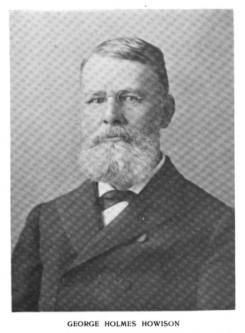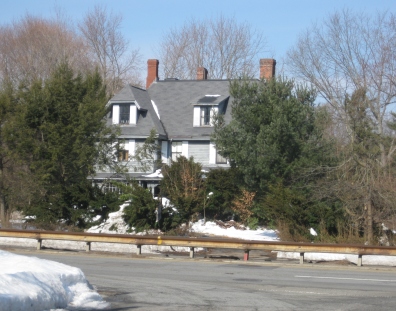Writing this particular post makes me regret not having taken philosophy in college. It just seemed like a whole bunch of gobbledygook. So it’s probably not surprising that I’m struggling to write about George Holmes Howison, a Wellesley resident during the 1870s and early 1880s and one of America’s preeminent philosophers. I just can’t seem to explain his significance to the American philosophical movement during the late 19th Century. Maybe Howison’s writing would make more sense to me if I had studied Kant or Hegel, two philosophers who greatly influenced him. Fortunately, I’ve figured out a way to avoid all that philosophy mumbo jumbo. According to Friedrich Nietzsche, “philosophy is the biography of a philosopher.” So instead of trying to understand esoteric philosophies, all I need to do is focus on Howison’s life story.
And really, we only need to examine one event from his life to understand his philosophical views. This event occurred in 1838 when Howison was only four years old and living in Maryland. Rather abruptly, his slave-owning parents denounced slavery, freed their slaves, and relocated to the free soil of Marietta, Ohio. Such a profound statement must have made quite an impression on their young son. So much so that the decades Howison spent as a philosopher were focused almost exclusively on the idea of personalism, a concept dealing with the uniqueness and value of an individual.
It wasn’t until much later, however, that Howison would begin writing about personalism. In fact, he was not even exposed to the influential works of Kant and Hegel until the mid-1860s when he was a professor at Washington University in St. Louis where he taught mechanics, astronomy, political economy, and even Latin. At the invitation from a friend, he had joined a small group that read and discussed the writing of German philosophers of the late 18th and early 19th Centuries. It was also in this discussion group where he would meet such notable American thinkers as Ralph Waldo Emerson and Amos Bronson Alcott. In addition to inspiring Howison to deepen and formalize his own thoughts, Emerson and Alcott made him long for New England where intellectuals seemed to flourish and prosper.
Howison got his wish in 1871 when M.I.T. offered him a position as Professor of Logic and Philosophy of Science. And thus began his connection to Wellesley. In 1874, Howison purchased a small tract of land along Worcester Street (across from Rockland Street) and built a stately Queen Anne Victorian for himself and his wife, Lois.
Howison’s presence in Wellesley, however, didn’t last very long. In 1878, M.I.T. terminated his position due to the poor financial state of the university. It was during this period of relative unemployment that Howison began to write and develop his philosophical ideas. He even traveled to Europe and enrolled in a philosophy class at the University of Berlin where he was exposed to even more Kant and Hegel. This experience inspired Howison to pursue a career in philosophy. However, he nearly lost that ambition when he was denied a coveted philosophy professorship at Harvard in 1882. Feeling dispirited and rejected, he strongly considered leaving academia. After all, Howison was almost fifty years old and felt that there wasn’t enough time left to accomplish much.
Nevertheless, Howison kept searching and finally found success in 1884 when he was selected as the first philosophy professor at the University of California in Berkeley. Over the next two decades, he helped the philosophy department at Berkeley become one of the leading programs in the nation. As the department chair, he hired professors that shared his Hegelian view of personalism. In addition, Howison was a masterful teacher whose students attained positions at some of the most highly regarded institutions throughout the world. By the time he finally retired in 1904, his philosophies were well ingrained within American thought. Howison died twelve years later at the age of 82.
So that’s the best I can do to explain why George Holmes Howison was such an important figure to the development of American philosophy. I can’t say that I really understand that much about what he wrote, but at least I know a little bit about his life story. And according to Nietzsche, that’s worth something.
(A post script: Howison sold his Worcester Street house in 1887 to Warren Sawyer, a prominent Boston businessman who worked in the leather trade. The Sawyer family resided there until 1943. Sawyer Road, located to the north of the property, takes its name from that family.)
Sources:
- Wellesley Historical Commission files: #507 Worcester Street
- Schools and Schoolboys of Old Boston by Arthur Wellington Brayley (1894)
- Illustrated History of the University of California by William Carey Jones (1895)
- The Spokesman-Review: 1 January 1917
- Berkeley Daily Gazette: 16 November 1934
- The Dictionary of Modern American Philosophers, Volume 1 by John R. Shook (2005)


